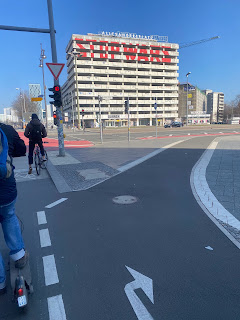Unterkunft für Flüchtlinge
Wir nehmen Menschen aus der Ukraine auf und schaffen dabei einen sicheren Raum für Frauen und Kinder

Seit Mitte März bieten wir Unterkunft und einen sicheren Raum für Flüchtlinge an. Über die letzten vier Wochen haben wir insgesamt 15 Frauen und Kinder aus der Ukraine aufgenommen. Zurzeit leben noch 10 Menschen bei uns und geplant ist, noch ein paar Familien dazu zu holen. Mit 15 Schlafzimmern liegt unser maximale Zahl irgendwo zwischen 20 und 25 Menschen. Bei einer höheren Zahl müssen wir allerdings weitere Toiletten und Duschen einbauen. Für das Gemeinschaftsleben ist eine Bewohnerzahl von 15 Menschen wahrscheinlich angenehmer. Wir werden sehen, wie sich die Situation in den kommenden Monaten entwickelt. Wenn große Not vorliegt, würden wir gerne Unterkunft anbieten und uns so organisieren dass alle hier angenehm leben können.
Unser Haupthaus ist zwischen 1940 und 1942 gebaut geworden und hat Arbeiter von der Sprengchemie untergebracht...
Damals war Platz für ungefähr 35 Menschen. Nach dem Krieg diente das Gebäude kurzzeitig als Kinderheim. Viele Menschen aus der Region erinnern sich noch an den Ort während der NVA-Zeit, als hier Tankfahrzeuge gewartet wurden. Ab der deutschen Wiedervereinigung fiel das Gelände in die Hände des Grenzschutzes. Seit 2010 ist es in Privatbesitz. Krieg und militärische Nutzung sind, sozusagen, keine neue Erfahrung für unser Haupthaus. Es ist also eine gute Erweiterung der Geschichte des Gebäudes, Unterkunft und Schutzräume für Menschen, die vor dem aktuellen Krieg in der Ukraine fliehen, anzubieten.
Die Renovierung des sanierungsbedürftigen Haupthauses wird in ein oder zwei Jahren stattfinden. Wir sind nun mitten im Planungsprozess und werden bald ein Baugenehmigungsantrag einreichen. In dem Hauptteil des Gebäudes sind die Heizung und Wasserleitungen schon über 10 Jahre abgeklemmt geworden. Die LeiterInnen von KuNaKu, Manuel Hülsmann und Liz Erber, wollten aber im aktuellen Krieg helfen und wussten dass Unterkünfte gebraucht werden. Mit der Hilfe von dutzenden von Freiwilligen haben sie über drei Wochen 15 Schlafzimmern geschaffen, eine neue Küche und zwei neue Bäder eingebaut, sowie mehrere Gemeinschaftsräume eingerichtet. Jede Familie hat ein Schlafzimmer mit ein bis drei Betten, während größere Familien zwei Zimmer bewohnen. Unser größerer Salon funktioniert jetzt als ein Gemeinschaftswohn- und Esszimmer. Es gibt zusätzlich einen zweiten Wohnzimmerbereich mit einem großen Fernseher, sowie ein Spielzimmer und einen Bewegungsraum für Tanz und Yoga. Bei gutem Wetter kann man auf der Terrasse entspannen, essen oder eine Kaffee genießen. Wir bedanken uns sehr herzlich für Ihre Hilfe und die reichliche Sachspenden, die wir erhalten haben, um unseren Ort gut auszustatten. Durch die Zusammenarbeit und die Bereitschaft von vielen Menschen haben wir etwas Großartiges geschafft! Unsere Gäste sind natürlich auch sehr dankbar.
Sehe Fotos und ein Video beim letzten Blog Eintragung (auf Englisch).
Unsere Gäste sind froh, hier angekommen zu sein, und wollen länger im Haus bleiben, außer eine Gruppe, die Verwandte in einem anderen Land hatten und weiter gereist sind. Bis jetzt haben wir uns für kein Enddatum entschieden. Weil wir abhängig von Elektro- und Propangasheizungen sind, war es für uns unrealistisch, durch den Winter zu heizen. Wir werden aber niemanden rausschmeißen und wenn es von unseren Gästen gewünscht ist, hier auch über den nächsten Winter zu wohnen, werden wir eine Lösung finden.
Zurzeit stehen in Oderberg eine Reihe Wohnungen frei. Unsere Gäste haben aber gesagt, dass es ihnen ohne Deutschkenntnisse lieber ist zusammen in Gemeinschaft zu bleiben, an einem Ort wo sie leichter an Unterstützung kommen können. Ob sie in zwei oder drei Monaten etwas anderes wünschen, werden sie sehen. Man muss auch bedenken, dass die meisten Menschen, die aus der Ukraine eingetroffen sind, Frauen sind, die oft mit Kindern oder älteren Verwandten reisen. Eine Frau bei uns ist alleine mit drei relativ jungen Kindern eingereist. Gemeinschaft kann sehr hilfreich sein für Frauen, die alleine mit Kindern wohnen. Sie erleben täglich viel Stress, tragen viel Verantwortung, während sie selbst nicht wissen wie es weiter geht. Sie brauchen ab und zu jemanden, der auf ihre Kinder aufpasst. In unser Gemeinschaft erleben wir, wie jeder den anderen unterstützt, sodass auch die Mütter immer wieder paar Minuten freihaben.
Wie Sie helfen können:
Deutschkurs: Wir sind auf der Suche nach jemandem, der oder die einen regelmäßigen Deutschkurs, ein oder zweimal in der Woche, bei uns anbieten kann.
Kinderbetreuung: Betreuung ist während des Deutschkurses, ab und zu an Wochenenden, und während unseres Cafés der Kulturen gewünscht.
Patenpartner: ein Patenpartner bietet ihrem Flüchtlingspartner freundliche Hilfe an, um das deutsche System besser verstehen zu lernen, Formulare auszufüllen, oder als Ansprechpartner bei Terminen, für die Deutschkenntnisse wichtig sind. Es ist unterschiedlich, was gebraucht wird und manchmal ist es einfach wichtig mit jemandem zu sprechen.
Sachspende: Wir können Laptops, Kühlschränke, Kleiderschränke, Wäscheständer, Kleiderhänge und Vorhänge gebrauchen. Bitte sprechen Sie mal mit uns bevor Sie etwas kaufen oder zu uns anschleppen!
Geldspenden sind auch willkommen. Wir können gern eine Spendenquittung für Sie ausstellen.
Eigene Ideen? Fragen Sie uns einfach.
Kommende Termine – Machen Sie mit!
Vorher anmelden ist erwünscht
- wöchentliches Yoga, dienstags um 16:30, Fliederweg 1, Oderberg
- 30. April, 11 – 14 Uhr: Gemeinschafsgarten Treff, Platz der Einheit, Oderberg
- 30. April, 14 – 17 Uhr: Café der Kulturen, durch Backen die Welt kennenlernen: Pyrizhky, gefülltes ukrainisches Gebäck, Kinder- und Jugendtreff, Platz der Einheit 14, Oderberg
- 30. April, 17 – 21 Uhr: Kinderabend und Kinderkino, Kinder- und Jugendtreff, Platz der Einheit 14, Oderberg









































